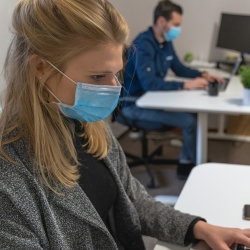To provide the best experiences, we use technologies like cookies to store and/or access device information. Consenting to these technologies will allow us to process data such as browsing behaviour or unique IDs on this site. Not consenting or withdrawing consent, may adversely affect certain features and functions.
The technical storage or access is strictly necessary for the legitimate purpose of enabling the use of a specific service explicitly requested by the subscriber or user, or for the sole purpose of carrying out the transmission of a communication over an electronic communications network.
The technical storage or access is necessary for the legitimate purpose of storing preferences that are not requested by the subscriber or user.
The technical storage or access that is used exclusively for statistical purposes.
The technical storage or access that is used exclusively for anonymous statistical purposes. Without a subpoena, voluntary compliance on the part of your Internet Service Provider, or additional records from a third party, information stored or retrieved for this purpose alone cannot usually be used to identify you.
The technical storage or access is required to create user profiles to send advertising, or to track the user on a website or across several websites for similar marketing purposes.
 Hybrid working could save the NHS more than £4 billion per year by giving workers more time to look after themselves and their families, according to a new study by Virgin Media O2 Business and the Centre for Economics and Business Research (Cebr). (more…)
Hybrid working could save the NHS more than £4 billion per year by giving workers more time to look after themselves and their families, according to a new study by Virgin Media O2 Business and the Centre for Economics and Business Research (Cebr). (more…)









 Throughout the pandemic, we have had to constantly adapt to new models of work and a new working culture. And what makes this process even more challenging is that we’re having to work against a backdrop of uncertainty at every turn. Business leaders that are emerging from the pandemic successfully have been clear on priorities throughout and know how to balance them. This is certainly easier said than done but is integral to leadership as we enter the next chapter of workplace transformation.
Throughout the pandemic, we have had to constantly adapt to new models of work and a new working culture. And what makes this process even more challenging is that we’re having to work against a backdrop of uncertainty at every turn. Business leaders that are emerging from the pandemic successfully have been clear on priorities throughout and know how to balance them. This is certainly easier said than done but is integral to leadership as we enter the next chapter of workplace transformation. 
 The latest research from
The latest research from 
 With more of us working remotely than ever before,
With more of us working remotely than ever before, 
 With the vast majority (86 percent) of UK businesses planning to offer employees greater flexibility around where they work, leaders are focused on ensuring employees feel included regardless of their location, according to new research from
With the vast majority (86 percent) of UK businesses planning to offer employees greater flexibility around where they work, leaders are focused on ensuring employees feel included regardless of their location, according to new research from 
 According to a
According to a 
 Pressing the ‘reset’ button is never easy. But I’m a firm believer that, once we do, we become much less averse than we perhaps expected to the change it inevitably brings. This is particularly true of the past eighteen months. From all of the sadness and hardship endured, we are beginning to emerge into a new, changed way of living. One that is both familiar and altogether different. The dichotomy is particularly evident in our workplaces. For many sections of the economy, the office was the ecosystem of our daily working lives. Initial questions of whether the office would survive quickly fell by the wayside, and a more interesting, nuanced, debate of what we want the office to be began.
Pressing the ‘reset’ button is never easy. But I’m a firm believer that, once we do, we become much less averse than we perhaps expected to the change it inevitably brings. This is particularly true of the past eighteen months. From all of the sadness and hardship endured, we are beginning to emerge into a new, changed way of living. One that is both familiar and altogether different. The dichotomy is particularly evident in our workplaces. For many sections of the economy, the office was the ecosystem of our daily working lives. Initial questions of whether the office would survive quickly fell by the wayside, and a more interesting, nuanced, debate of what we want the office to be began. 
 The workplace power dynamic has shifted in favour of employees, according to a new study released from BCW in partnership with Workplace from Facebook (now Meta of course). The inaugural
The workplace power dynamic has shifted in favour of employees, according to a new study released from BCW in partnership with Workplace from Facebook (now Meta of course). The inaugural 
 The latest research from
The latest research from 
 Three-quarters of tech leaders think Gen Z will solve the digital skills shortage (72 percent), with an even higher number (77 percent) believing these ‘digital-natives’ have the best ability of any generation. However, while half of Gen Z have a career in tech or firm plans to pursue one in the next five years (46 percent), they have low confidence in their digital abilities.
Three-quarters of tech leaders think Gen Z will solve the digital skills shortage (72 percent), with an even higher number (77 percent) believing these ‘digital-natives’ have the best ability of any generation. However, while half of Gen Z have a career in tech or firm plans to pursue one in the next five years (46 percent), they have low confidence in their digital abilities. 








November 11, 2021
Hybrid working is both a challenge and opportunity for comms firms
by Andrew Walker • Comment, Flexible working, Technology